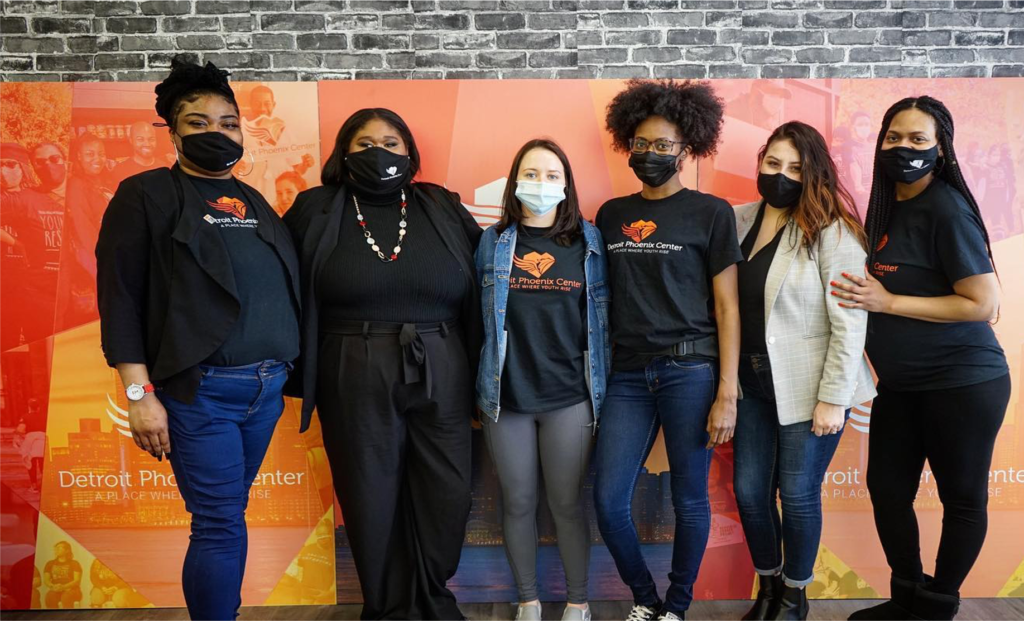
For our fourth challenge of the 2020-2021 program year, we collaborated with nonprofit Detroit Phoenix Center (DPC) addressing the topic of youth homelessness and poverty. We partnered with founder and CEO Courtney Smith, a Detroiter passionate about servant leadership and advocacy, and her team – Shadanna Mix, Sade Beck, Zara Northover, Aimee Tiemann and DPC youth and stakeholders over the six-weeks of our project. Learn more about our collaboration below.
What is the mission of Detroit Phoenix Center?
Detroit Phoenix Center, launched in 2017 by Courtney Smith, has a mission to empower youth who are at-risk or currently experiencing homelessness with the resources needed to improve health, wellness, and self-sufficiency.

Founder & CEO Courtney Smith with DPC youth and staff
What was the focus of the Detroit Phoenix Center challenge project?
This project focused on five core areas that Courtney identified as opportunities to contribute and collaborate on – identifying a potential site for a new, expanded DPC headquarters, identifying emergency housing options during and beyond COVID-19, shaping outreach and awareness-building strategies to connect with more youth both online and offline, building out content for a DPC app for resource-sharing, and planning the launch of a youth-driven podcast. Our overall project design prompt was, “How might we support youth transitioning out of homelessness and poverty in Detroit with critical resources?
Nick, Dee, Panchito, and Maddie, as the Space Support team, what was a highlight of working on this project?
The experience our team had working with the Detroit Phoenix Center has been great! DPC does very meaningful work in the City of Detroit for youth. The highlight of our team was knowing that we’ve had a part in helping DPC to take steps towards making a new headquarter space a reality. Our final deliverables included creative recommendations for the new space such as mailboxes for each youth and an area to offer youth a chance to learn to design, print and sell custom T-shirts. We also proposed elements of green infrastructure that might allow the headquarters to achieve green credits or certifications like LEED Innovative greenspaces. A beautiful rooftop garden could serve as both a source of healthy food for DPC and even earned income. Ultimately, we lifted up unique communal spaces that would reflect the value of the DPC experiences and allow everyone to gather as “DPC Family”, regardless of the chosen location.
Sydney, Tricia, Paige and Erica, what recommendations did you create as the Emergency Housing team?
Our team focused on forming recommendations for potential partnerships and partner outreach materials for Detroit Phoenix Center to strengthen their emergency housing resources. Housing is a basic human right, and especially needed in the wake of the Covid-19 pandemic. Previously, DPC provided drop-in housing at their Woodward Ave location, but hasn’t been able to continue because of the pandemic. We provided options for different innovative forms of emergency housing that DPC could implement, both “short-term” and “long-term.” Our recommendations were centered around potential partnerships DPC could establish with hotels, corporate partners, and nonprofits with similar missions that could either provide emergency housing or additional resources. We were honored and humbled to work with DPC – we each learned so much from our partner liaison and our research, and we are inspired by how DPC uplifts youth.
Triniti, Phancie, Emi and Jocelyn (Outreach Team), what is a key learning that stands out to you from this project?
We learned the importance of centering our use of language around lived experiences vs. stigma when talking about youth homelessness. Youth homelessness does not look like what you may imagine.
Rieanna, Jackie, Sabrina and Hannah M, can you share the outcomes of your work on the DPC app?
We are honored to be immersed in this work with DPC and their network, which provided a deeper understanding of how poverty and disinvestment are impacting our youth. We provided recommendations on digital content for the app being developed by DPC and Detroit Labs’ “App for a Cause”. Our final results were the content strategy and content creation which will best support the digital app creation in the near future. It was important that we were able to amplify the ways in which phones and digital devices serve as a lifeline for building real connection in the DPC community – and beyond. We wanted to make sure that youth have access to whatever resources they need and are able to receive them at the click of a button.
Vanessa, Vishnu, Hannah H, Jeff, and Andrea, can you share about the vision and plans for the expected launch of the youth-driven podcast and any take-aways you had?
In finishing this project, we are humbled at the impact we hope to have had on moving the vision and plans forward for DPC’s podcast program. We built a curriculum for youth to learn about podcasting, a mobile studio launch kit, and a content strategy planning deck focused on maximizing the podcast’s impact when it launches this fall. We are really excited about the adaptable and accessible curriculum for the “DPC Podcast Academy.” The vision for this academy is to introduce youth to podcasting and audio storytelling by educating them about the components of a show and having them work through the requisite roles (producing, editing, writing etc.) while gaining exposure to a growing media industry and bringing shine to DPC.
One of our biggest takeaways was from an interview we had with Pastor Aramis – he said, “Youth are powerful. Youth are smart. Youth have a voice. Youth matter.”
Courtney, what has been valuable about collaborating with Challenge Detroit on a project?
The most valuable aspect of working with the Fellows was their willingness to lean in and center the voices of our stakeholders and truly think outside of the box as it relates to project deliverables. A highlight for our DPC team was seeing the work we are already doing reimagined in a way that can deepen our impact.
***
